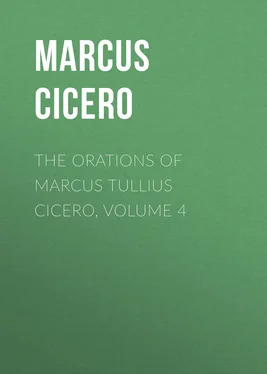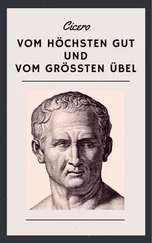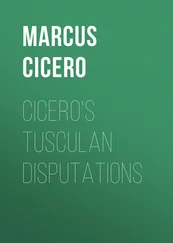Marcus Cicero - The Orations of Marcus Tullius Cicero, Volume 4
Здесь есть возможность читать онлайн «Marcus Cicero - The Orations of Marcus Tullius Cicero, Volume 4» — ознакомительный отрывок электронной книги совершенно бесплатно, а после прочтения отрывка купить полную версию. В некоторых случаях можно слушать аудио, скачать через торрент в формате fb2 и присутствует краткое содержание. Жанр: foreign_antique, Философия, foreign_edu, на английском языке. Описание произведения, (предисловие) а так же отзывы посетителей доступны на портале библиотеки ЛибКат.
- Название:The Orations of Marcus Tullius Cicero, Volume 4
- Автор:
- Жанр:
- Год:неизвестен
- ISBN:нет данных
- Рейтинг книги:3 / 5. Голосов: 1
-
Избранное:Добавить в избранное
- Отзывы:
-
Ваша оценка:
- 60
- 1
- 2
- 3
- 4
- 5
The Orations of Marcus Tullius Cicero, Volume 4: краткое содержание, описание и аннотация
Предлагаем к чтению аннотацию, описание, краткое содержание или предисловие (зависит от того, что написал сам автор книги «The Orations of Marcus Tullius Cicero, Volume 4»). Если вы не нашли необходимую информацию о книге — напишите в комментариях, мы постараемся отыскать её.
The Orations of Marcus Tullius Cicero, Volume 4 — читать онлайн ознакомительный отрывок
Ниже представлен текст книги, разбитый по страницам. Система сохранения места последней прочитанной страницы, позволяет с удобством читать онлайн бесплатно книгу «The Orations of Marcus Tullius Cicero, Volume 4», без необходимости каждый раз заново искать на чём Вы остановились. Поставьте закладку, и сможете в любой момент перейти на страницу, на которой закончили чтение.
Интервал:
Закладка:
I will say no more, lest I should seem to be pulling to pieces the acts of Dolabella; which must inevitably sometime or other be brought before our college. But take notice of the arrogance and insolence of the fellow. As long as you please, Dolabella is a consul irregularly elected; again, while you please, he is a consul elected with all proper regard to the auspices. If it means nothing when an augur gives this notice in those words in which you gave notice, then confess that you, when you said,—"We adjourn this to another day," were not sober. But if those words have any meaning, then I, an augur, demand of my colleague to know what that meaning is.
But lest by any chance, while enumerating his numerous exploits, our speech should pass over the finest action of Marcus Antonius, let us come to the Lupercalia.
XXXIV. He does not dissemble, O conscript fathers; it is plain that he is agitated; he perspires; he turns pale. Let him do what he pleases, provided he is not sick, and does not behave as he did in the Minucian colonnade. What defence can be made for such beastly behaviour? I wish to hear, that I may see the fruit of those high wages of that rhetorician, of that land given in Leontini. Your colleague was sitting in the rostra, clothed in purple robe, on a golden chair, wearing a crown. You mount the steps; you approach his chair; (if you were a priest of Pan, you ought to have recollected that you were consul too;) you display a diadem. There is a groan over the whole forum. Where did the diadem come from? For you had not picked it up when lying on the ground, but you had brought it from home with you, a premeditated and deliberately planned wickedness. You placed the diadem on his head amid the groans of the people; he rejected it amid great applause. You then alone, O wicked man, were found, both to advise the assumption of kingly power, and to wish to have him for your master who was your colleague; and also to try what the Roman people might be able to bear and to endure. Moreover, you even sought to move his pity; you threw yourself at his feet as a suppliant; begging for what? to be a slave? You might beg it for yourself, when you had lived in such a way from the time that you were a boy that you could bear everything, and would find no difficulty in being a slave; but certainly you had no commission from the Roman people to try for such a thing for them.
Oh how splendid was that eloquence of yours, when you harangued the people stark naked! What could be more foul than this? more shameful than this? more deserving of every sort of punishment? Are you waiting for me to prick you more? This that I am saying must tear you and bring blood enough if you have any feeling at all. I am afraid that I may be detracting from the glory of some most eminent men. Still my indignation shall find a voice. What can be more scandalous than for that man to live who placed a diadem on a man's head, when every one confesses that that man was deservedly slain who rejected it? And, moreover, he caused it to be recorded in the annals, under the head of Lupercalia, "That Marcus Antonius, the consul, by command of the people, had offered the kingdom to Caius Caesar, perpetual dictator; and that Caesar had refused to accept it." I now am not much surprised at your seeking to disturb the general tranquillity; at your hating not only the city but the light of day; and at your living with a pack of abandoned robbers, disregarding the day, and yet regarding nothing beyond the day. 20 20 The Latin is, "non solum de die, sed etiam in diem, vivere;" which the commentators explain, "De die is to feast every day and all day. Banquets de die are those which begin before the regular hour." (Like Horace's Partem solido demere de die.) "To live in diem is to live so as to have no thought for the future."—Graevius.
For where can you be safe in peace? What place can there be for you where laws and courts of justice have sway, both of which you, as far as in you lay, destroyed by the substitution of kingly power? Was it for this that Lucius Tarquinius was driven out; that Spurius Cassius, and Spurius Maelius, and Marcus Manlius were slain; that many years afterwards a king might be established at Rome by Marcus Antonius, though the bare idea was impiety? However, let us return to the auspices.
XXXV. With respect to all the things which Caesar was intending to do in the senate on the ides of March, I ask whether you have done anything? I heard, indeed, that you had come down prepared, because you thought that I intended to speak about your having made a false statement respecting the auspices, though it was still necessary for us to respect them. The fortune of the Roman people saved us from that day. Did the death of Caesar also put an end to your opinion respecting the auspices? But I have come to mention that occasion which must be allowed to precede those matters which I had begun to discuss. What a flight was that of yours! What alarm was yours on that memorable day! How, from the consciousness of your wickedness, did you despair of your life! How, while flying, were you enabled secretly to get home by the kindness of those men who wished to save you, thinking you would show more sense than you do! O how vain have at all times been my too true predictions of the future! I told those deliverers of ours in the Capitol, when they wished me to go to you to exhort you to defend the republic, that as long as you were in fear you would promise everything, but that as soon as you had emancipated yourself from alarm you would be yourself again. Therefore, while the rest of the men of consular rank were going backwards and forwards to you, I adhered to my opinion, nor did I see you at all that day, or the next; nor did I think it possible for an alliance between virtuous citizens and a most unprincipled enemy to be made, so as to last, by any treaty or engagement whatever. The third day I came into the temple of Tellus, even then very much against my will, as armed men were blockading all the approaches. What a day was that for you, O Marcus Antonius! Although you showed yourself all on a sudden an enemy to me; still I pity you for having envied yourself.
XXXVI. What a man, O ye immortal gods! and how great a man might you have been, if you had been able to preserve the inclination you displayed that day;—we should still have peace which was made then by the pledge of a hostage, a boy of noble birth, the grandson of Marcus Bambalio. Although it was fear that was then making you a good citizen, which is never a lasting teacher of duty; your own audacity, which never departs from you as long as you are free from fear, has made you a worthless one. Although even at that time, when they thought you an excellent man, though I indeed differed from that opinion, you behaved with the greatest wickedness while presiding at the funeral of the tyrant, if that ought to be called a funeral. All that fine panegyric was yours, that commiseration was yours, that exhortation was yours. It was you—you, I say—who hurled those firebrands, both those with which your friend himself was nearly burnt, and those by which the house of Lucius Bellienus was set on fire and destroyed. It was you who let loose those attacks of abandoned men, slaves for the most part, which we repelled by violence and our own personal exertions; it was you who set them on to attack our houses. And yet you, as if you had wiped off all the soot and smoke in the ensuing days, carried those excellent resolutions in the Capitol, that no document conferring any exemption, or granting any favour, should be published after the ides of March. You recollect yourself, what you said about the exiles; you know what you said about the exemption; but the best thing of all was, that you for ever abolished the name of the dictatorship in the republic. Which act appeared to show that you had conceived such a hatred of kingly power that you took away all fear of it for the future, on account of him who had been the last dictator.
Читать дальшеИнтервал:
Закладка:
Похожие книги на «The Orations of Marcus Tullius Cicero, Volume 4»
Представляем Вашему вниманию похожие книги на «The Orations of Marcus Tullius Cicero, Volume 4» списком для выбора. Мы отобрали схожую по названию и смыслу литературу в надежде предоставить читателям больше вариантов отыскать новые, интересные, ещё непрочитанные произведения.
Обсуждение, отзывы о книге «The Orations of Marcus Tullius Cicero, Volume 4» и просто собственные мнения читателей. Оставьте ваши комментарии, напишите, что Вы думаете о произведении, его смысле или главных героях. Укажите что конкретно понравилось, а что нет, и почему Вы так считаете.












